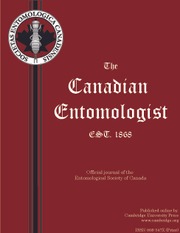Crossref Citations
This article has been cited by the following publications. This list is generated based on data provided by
Crossref.
Pinto, John D.
1972.
A TAXONOMIC REVISION OF THE GENUS CORDYLOSPASTA (COLEOPTERA: MELOIDAE) WITH AN ANALYSIS OF GEOGRAPHIC VARIATION IN C. OPACA.
The Canadian Entomologist,
Vol. 104,
Issue. 8,
p.
1161.
Pinto, John D.
1972.
A SYNOPSIS OF THE BIONOMICS OF PHODAGA ALTICEPS (COLEOPTERA: MELOIDAE) WITH SPECIAL REFERENCE TO SEXUAL BEHAVIOR.
The Canadian Entomologist,
Vol. 104,
Issue. 4,
p.
577.
Gerber, G. H.
and
Church, N. S.
1973.
COURTSHIP AND COPULATION IN LYTTA NUTTALLI (COLEOPTERA: MELOIDAE).
The Canadian Entomologist,
Vol. 105,
Issue. 5,
p.
719.
Pinto, John D.
1977.
SEXUAL BEHAVIOR IN THE BLISTER BEETLE GENUS CYSTEODEMUS (COLEOPTERA: MELOIDAE).
The Canadian Entomologist,
Vol. 109,
Issue. 3,
p.
389.
PINTO, JOHN D.
1984.
Cladistic and phenetic estimates of relationship among genera of eupomphine blister beetles (Coleoptera: Meloidae).
Systematic Entomology,
Vol. 9,
Issue. 2,
p.
165.
PINTO, J. D.
1999.
The New World genera of Meloidae (Coleoptera): a key and synopsis.
Journal of Natural History,
Vol. 33,
Issue. 4,
p.
569.
Pinto, John D.
2010.
A New Species of Denierota Kaszab from Mexico (Coleoptera: Meloidae).
Proceedings of the Entomological Society of Washington,
Vol. 112,
Issue. 4,
p.
555.
Bravo, Carolina
Mas-Peinado, Paloma
Bautista, Luis Miguel
Blanco, Guillermo
Alonso, Juan Carlos
and
García-París, Mario
2017.
Cantharidin is conserved across phylogeographic lineages and present in both morphs of Iberian Berberomeloe blister beetles (Coleoptera, Meloidae).
Zoological Journal of the Linnean Society,
Vol. 180,
Issue. 4,
p.
790.
López-Estrada, Estefany Karen
Sanmartín, Isabel
García-París, Mario
and
Zaldívar-Riverón, Alejandro
2019.
High extinction rates and non-adaptive radiation explains patterns of low diversity and extreme morphological disparity in North American blister beetles (Coleoptera, Meloidae).
Molecular Phylogenetics and Evolution,
Vol. 130,
Issue. ,
p.
156.
GONZÁLEZ‐FERREIRO, Mario
GARCÍA‐PARÍS, Mario
SAINZ‐ESCUDERO, Lucía
and
LÓPEZ‐ESTRADA, E. Karen
2023.
Analyses of head and thorax in Eupomphini (Meloidae) suggest that complex behaviors are not associated to changes in general shape.
Integrative Zoology,
Vol. 18,
Issue. 5,
p.
949.


